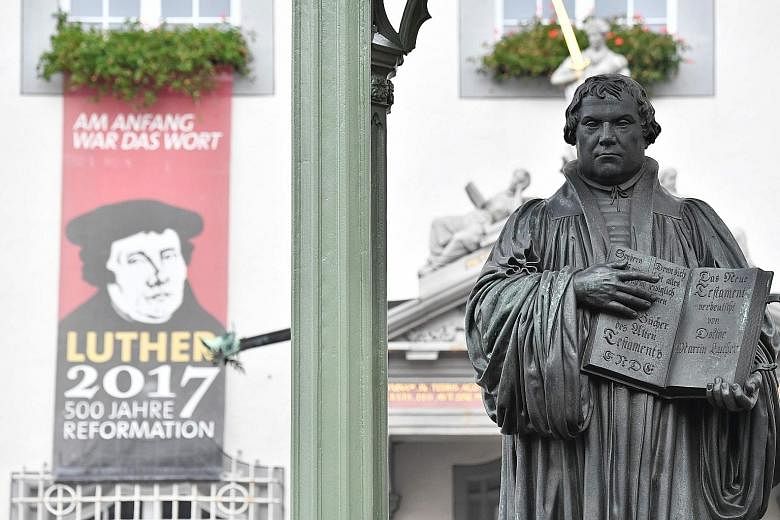WITTENBERG (Germany) • Germany yesterday celebrated 500 years since theologian Martin Luther nailed his "95 theses" to a church door, marking the start of the Reformation that created the Protestant Church and transformed European society.
German Chancellor Angela Merkel and President Frank-Walter Steinmeier attended a service at the church where Luther is said to have first displayed his list of criticisms of the Catholic Church in 1517.
The service at the gothic Schlosskirche (All Saints' Church) in Wittenberg marked the end of year-long celebrations by Protestants in 700 German towns and cities.
Catholic and Lutheran leaders, meanwhile, issued a joint statement saying they begged forgiveness for the violence waged following the Reformation which caused major upheaval in Europe - leading to wars, persecutions and exoduses, including the departure of the Pilgrims for what was later to become America.
The deadliest of Europe's religious conflicts was the Thirty Years' War, which ended in 1648 and after which religion's role in European politics was reduced.
"We begged forgiveness for our failures and for the ways in which Christians have... offended each other during the 500 years since the beginning of the Reformation until today," said the Vatican and the Lutheran World Federation.
Luther's main complaint was against the Catholic concept of "indulgences", whereby a repentant sinner could reduce punishment in purgatory through monetary contributions to the Church.
He said Christians could not buy or earn their way into heaven but entered only by the grace of God.
Luther, then in his early 30s, also attacked papal abuses and questioned the place of saints. His challenge led to a historic break from the Catholic Church.
He was excommunicated just over three years later, but the Reformation had been launched. His message spread quickly, disseminated by the developing printing press.
The theologian's name has also been associated with one of Germany's darkest periods: His attacks on Judaism in his writings were used as a reference for Nazi ideology.
Dr Merkel, herself the daughter of a Protestant pastor, said it was essential that Luther's anti-Semitism never be scrubbed from his theological legacy. "That is, for me, the comprehensive historical reckoning that we need," she said in her weekly video podcast last Saturday.
Wittenberg, a town of 47,000 inhabitants 100km south-west of Berlin, has seen seen tens of thousands of Christian visitors from around the world in recent months.
A row over a mediaeval anti-Semitic carving which remains on the facade of another church in the town risked overshadowing the celebrations.
A petition started by British theologian Richard Harvey has called for the sculpture to be removed from the public sphere and displayed in a museum.
AGENCE FRANCE-PRESSE

